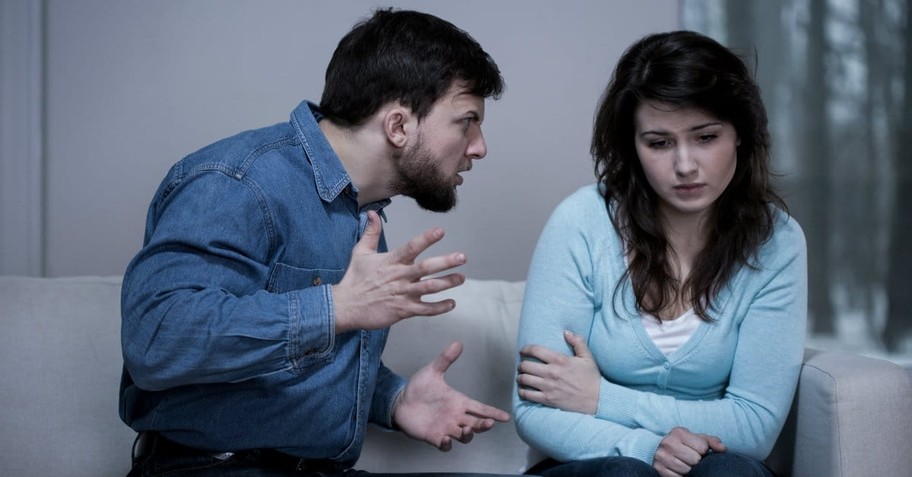4 Problems of Leaving an Emotionally Abusive Marriage

Not all marriages are wonderful marriages. Not all marriages are just difficult or troubled. Not every first year of marriage is just two people learning to get along and live together. Some marriages are toxic and abusive relationships, right from the start or on the wedding night. Victims become trapped and don’t know how to get out. They may even fear their safety, which makes it hard to escape. And once children arrive, a victim might find it impossible to leave.
What are the ten warning signs of emotional abuse in a relationship? (From this previous article.)
- Use of threats and coercion to manipulate
- Use of intimidation to control
- Blaming or making you responsible for partner’s problems
- Use of the children and male privilege
- Controlling all the household money
- Sabotaging other relationships and deciding who you spend time with and who you talk to
- Preventing you from working or attending school to better yourself
- Verbal attacks, insults, demeaning or degrading words or actions
- Blaming you for the abuse, calls you the abuser, or gaslights you to believe you’re crazy for thinking you’re being abused
- Destroys your property, break things, abuses pets or threatens to
I know first-hand how hard it is to leave an emotionally abusive marriage, and face the pain, destruction, and consequences after. Because of what I’ve experienced, my purpose and mission has become to educate Christians and walk with women (I only mentor women) into a life of peace and emotional health, without abuse. No person deserves to be abused, not physically, emotionally, or financially. A lot of times walking away, after asserting boundaries, means that Christians are faced with a divorce—many times one they didn’t even want.
But before that can happen, before a person can escape abuse, the victim has to overcome many problems when trying to leave. Sometimes problems come from well-meaning people and other times from someone who’s not educated in the severity of emotional abuse. Let’s work together, with a heart like God, in order to overcome these problems.
Photo Credit: © Getty Images/grinvalds

1. People Don’t Understand That Emotional Abuse Is Abuse Too
For many years, before I learned as much as I could about abuse, before I ever stepped foot inside a domestic violence shelter, I believed that the term abuse was only meant for physical abuse—hitting, kicking, punching, and other such violent injuries. I had never heard from any person I sought advice from about my marriage that a person cheating on their spouse was another sign of abuse (in many but not all cases). I was not told that my spouse withholding family money, refusing to buy groceries, me having to ask the church to pay my heating bill or put breaks on my van, was financial and emotional abuse. It was 1 Timothy 5:8, but instead of telling me that, they just provided for my family.
I learned to just accept all the trauma that I experienced in my marriage as either normal marriage problems, the first years of marriage difficulties, or something that I must be doing wrong. It wasn’t until I went to my local domestic violence shelter, saw the Power & Control Wheel, and really understood it, that I saw the truth about my marriage.
Unfortunately, even now, many years later, there are still a lot of pastors, counselors, and people helpers who do not fully understand emotional abuse, what that really looks like in a Christian marriage, especially if the abuser is covert in their abuse tactics. When we don’t tell a victim that what they’re experiencing is abuse, that they don’t deserve to be treated that way, we make it a little more difficult for them to leave.
Photo Credit: © Getty Images

2. When Abuse Victims Are Not Believed
In 2015, I asked the Christian University that I was attending if I could write my final field-based study and presentation on “The Need for Domestic Violence Training in the Church.” I had to submit a couple of proposal requests before my topic was approved. Even then my advisor suggested that I pick another topic because my topic was not suitable or necessary in a Christian University. I think I was just a little ahead of my time because now there are courses on domestic violence and abuse dynamics, even in some Christian schools.
Part of my thesis was to show that the first place a woman (see note below) will reach out for assistance with her confusing marriage is to her pastor and/or her church family. And most times the response she gets is, it’s not that bad or it’s not abuse, just normal marriage troubles, stick with it, it will get better with time and lots of prayer—he’ll come around. This is exactly what I heard time and time again, and I know many others have as well. The well-meaning pastor or helper who doesn’t want to see anyone divorce will give several suggestions on how to make and keep her husband happy, when his happiness will not stop the need he has for power and control. This actually feeds it.
Note: The male pronoun could be substituted and used here for woman/women/she/her/wife and the female pronoun for abuser/husband/he/him. For my study, I focused on battered women as the research at that time was limited to mainly male abusers and female victims. Now we know many men are abused each year as well.
Ultimately, the woman (see note above) is not believed if she says she’s experiencing abuse (or coercive control) at the hands of her husband if she can’t show any physical signs of abuse. Other times, she is told, “abuse is such a harsh word” and shouldn’t be used in her case, which is just minimizing the victim’s experience. Or worse, the woman is blamed for not being the wife that her husband needs to calm him down and make him want to love her. His words and actions become her responsibility to change, when frankly, that is just not possible in most cases and should never be her responsibility.
Lack of other’s understanding or belief makes it very difficult to leave because even a victim starts to minimize the abuse, or believe that she is to blame. Often times, victims need validation from someone educated in abuse dynamics to understand exactly the world she (or he) is living in. Before that, a person may not be able to see the abuse tactics and how they are harming everyone.
If you need to know whether you are in an abusive relationship, you can get the facts at thehotline.org.
Photo Credit: © Getty Images/Marjan Apostolovic

3. Helpers Asking Victims to Think about the Marriage Covenant over Their Safety or Emotional Well-Being
One of the problems that held me back and caused me to question the need for a separation and ultimately a divorce, was pastors, Christian counselors, and some marriage experts who kept reminding me that I made a convent with God when I took my vows and no one (not even an affair partner) was going separate us. I didn’t disagree with that fact. I still don’t. But they just never mentioned that the covenant had already been broken because of the abuse and adultery, and it wasn’t because I was wanting a divorce.
It is sin that causes the breakdown of these types of marriage, not the divorce or the victim wanting one. Many times the victim just wants to get off the emotional roller coaster, which is really the abuse cycle. I now believe this is what is missing when people helpers talk to a person who is in an abusive and/or adulterous marriage.
If we want to help people, we have to share the heart of God. The heart of God is for the hurting and disparaged, not for trapping the powerless in a promise that has already been broken. Malachi 2:16 is a statement for the protection of women, not a statement of God’s disapproval of divorce after sin has broken it. Divorce needs to happen to free the innocent spouse from the hard-hearted person who hates their spouse enough to abuse them.
Jesus had a heart for people. If we want to be more like Jesus, we too need to have a heart for people, not hatred for them. Don’t punish them because of the sins of their spouse. Marriage should be a place of protection, not harm. No human should be mistreated. And if they are, there should be a way to escape that mistreatment and consequences, which could involve divorce, for one doing the mistreating.
Photo Credit: © Getty Images/asiseeit

4. The Abuser Promising to Change
If you’ve ever met or talked to an abuser or serial adulterer who promised to stop their behaviors, get help, and not do it again, often through their tears, you may have believed them as being truly repentant. But those words are empty if they are not followed with faithful deeds. This kind of change takes hard work on the abuser’s part, work that they may want to do but don’t because of how hard it is to change a lifetime habit. This is especially true when someone is trying to change for someone else, and not really for themselves or out of a desire to please God.
Often they can pretend for a short time but when stress, hardship, and loss of control comes up again—and it always does—it is easier to snap back to old ways of thinking and behaving.
There is a reason why abusers treat other people this way—they get something out of it. They don’t want to lose that control. And most times they have never faced the consequences of their abusive nature, so they don’t stop. Ecclesiastes 8:11 is a reminder that, “When the sentence for a crime is not quickly carried out, people’s hearts are filled with schemes to do wrong.” When someone continually gets away with crimes or sin, they will continue because they know they will continue to get away with it.
Photo Credit: © Getty Images/Fizkes

So, How Does an Abuse Victim Overcome These Problems?
1.) We can and should believe victims, even if we think the abuser is the nicest, kindest person we know. Anyone can have an angry or controlling side that we won’t know about unless we’ve lived with that person. Remember, abuse is not about anger but about power and control. Abusers like to control their lives and the lives of those around them, oftentimes through manipulation. If they can’t fool you with their charm, they’ll do so with their anger.
Furthermore, marriage counseling between an abuser and a victim only makes matters at home worse for the victim, when the victim is sharing whole-heartedly, and the abuser is manipulating the entire situation. All abusers should signup for a batterer’s intervention program instead and work through their issues on their own (with the right help) before reconciliation is ever considered. If they’re not willing to do that, then divorce may be the only option.
2.) As we engage with abuse victims, and learn more about the dynamics of abuse, we can be better prepared for how to help victims. Allowing a physical separation, even for cases other than physical abuse, which may be necessary in order to judge if the abuser is really willing to do the work to change longterm.
3.) Pastors and Christians need to allow for divorce in cases of abuse. When the abuser is not willing to really do the needed work on themselves to stop abusing so that they too have the heart of God instead of hatred, then divorce should be an option for the long term health of the innocent spouse and the children.
We as Christians have come a long way in learning about abuse and abuse tactics, but we still have a long way to go to educated everyone and prevent victims from being further victimized by our efforts to help them.
If you are in any sort of abusive relationship, you can get help and find your way out. If you are a people helper, you can learn more too. I know I always am! The Domestic Violence Hotline is available 24-7 to assist all of us.
Jen Grice is a divorce mentor and empowerment coach guiding women to surviving and thriving after divorce – caused by abandonment, abuse, and/or adultery. She started Surviving + Thriving Ministries, after her own unwanted divorce in 2013. Now, she writes articles and books, creates videos, and has a "Stronger Woman After Divorce" group coaching program to walk with Christian women who want to heal and thrive after narcissistic abuse. You can find out more information about Jen, her ministry, and her coaching for women, at JenGrice.com.
Photo Credit: © Getty Images/Marjan
Originally published December 07, 2022.









